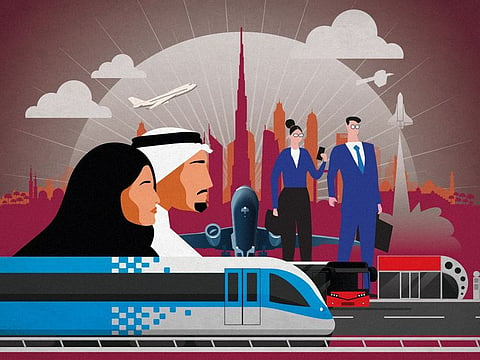UAE at 50: And here lies the future, the UN says
UAE has decided that history serves as a motivational platform to create a better future

The long history of this region has witnessed countless wars that led to the death of millions. But none was so tragic, long and absolutely absurd as the Dahis and Al Ghabra war.
That war, which began around the year 560AD, lasted 40 years. It broke out because of a horse race. The two horses, Dahis and Al Ghabra, belonged to competing tribal chiefs. The race was supposed to last 40 days and the winner would claim a 40-camel prize.
However, Al Ghabra’s owner cheated. He ordered his people to hide in a narrow valley in the last few days of the race. He told them to ambush and scare Dahis off if it was ahead. They did and Al Ghabra surely won but when the plot was revealed later the other tribe declared war to avenge the ‘humiliating’ defeat of their chief’s celebrated horse. And the war lasted four decades!
The name Dahis and Al Ghabra became thus synonymous with absurd conflicts and inter-Arab disputes. A stain on our history. Yet, many cite it as an example of how a bloody history and centuries-held animosities continue to hold us back and even have pitted us against each other more than a few times.
Hostage to the past
Subsequent ‘Dahis and Al Ghabras’ in the following 1,500 years held the Arabs back, collapsed kingdoms and destroyed a once-prospered civilisation that gifted the world countless inventions and scientific discoveries that historians say have paved the way for the industrial revolution.
Unfortunately, we could not let go the mindset that sparked that awful 40-year war. Our past continued until recently to hold us hostage. A past that divide us into tribes, sects, and states that live in constant hostility and tension.
This history seems to somehow override ambitions and aspirations. Even our first modern day attempt to reclaim our independence, during the final years of the First World War, was thwarted by petty disputes that led to the British and French occupation of most of the region.
Later, the same mindset led to another long and absurd war — the Lebanese civil war (1975-1990) that destroyed one of the most prosperous Arab countries in the first half of the 20th century. Today, the Syrian and Libyan wars present another example of the lasting legacy of Dahis and Al Ghabra.
However, one country has managed to escape this vicious cycle. While proud of its heritage and past, this country has for the past 50 years been looking forward, building a future-looking society that today is being recognised as an example of prosperity, peace and human innovation, one that presents in many cases solutions to the many ills of today’s world. This country is the UAE.
The UAE's glittering example
On Thursday, the United Nations Educational, Scientific and Cultural Organisation (UNESCO) has adopted the UAE’s National Day, December 2 as ‘World Futures Day’ — a great gesture by the world community to recognise the amazing story of this nation in its pursuit to create a better future not only for its people but for all humanity.
“The international recognition of the UAE as a country for the future, as a model for its vision, and as a major centre for its industry, places even greater responsibility on us to develop our capabilities in envisioning the future, keeping pace with its changes and benefiting from its opportunities,” His Highness Sheikh Mohammed Bin Rashid Al Maktoum, Vice-President and Prime Minister of the UAE and Ruler of Dubai, wrote on Twitter.
The decision was a unanimous at UNESCO’s General Conference that ended on Wednesday in Paris. According to the organisation, the move to declare December 2 a World Futures Day “came within the framework of its efforts to strengthen the capabilities of countries and governments to foresee the future, and to develop new means to enhance the international collaboration through conferences and workshops that encourage communities to participate in the process of creating the future.”
Audrey Azoulay, Director General of UNESCO, said the World Futures Day aims to raise awareness about the importance of developing a future mindset, which can contribute to expanding the readiness of governments to address various challenges, invent new solutions that nurture comprehensive development, and promote international dialogue and cooperation aimed at stimulating creativity and innovation.
Leading from the front
These are the exact characteristics of the UAE, a country that has been preparing for the future for almost two decades. For example, the digital government that we all cherish using its services from the comfort of our homes today, was conceived in the early years of this century when most of other countries were still struggling with addressing traditional problems — political, social and economic.
The international renewable energy organisation, Irena, which is key to develop renewable energy to fight the world’s greatest challenge, climate change, was conceptualised by the UAE and others.
It is headquartered in Abu Dhabi. The UAE is leading the charge, with the World Economic Forum, in the 4th Industrial Revolution, which is mostly focused on future industries.
The UAE refused to let the past define its future destiny. For decades, it has decided that history serves as a motivational platform to create a better future. Dahis and Al Ghabra is an unfortunate sequence in the long history of the Arabs that should not influence our nation building in a world that only recognise those who strife to excel in development.
The past five decades have been an epic journey of unparalleled development that began on that day of December 2, 1971 when the late Sheikh Zayed and the founding fathers established this Union. The world today recognises the powerful impact of this great journey.
Sign up for the Daily Briefing
Get the latest news and updates straight to your inbox


-1553756061188_16a30b3ef6a_medium.jpg?w=320&auto=format%2Ccompress&fit=max)



